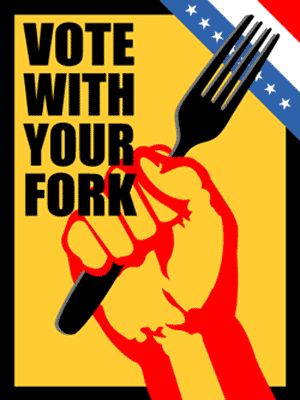Action Alert: Help Shape the Farm Bill
 Farming is an issue of great concern for us. We staked our business on switching to organic cotton in 1996 and we ran a series of environmental essays on the dangers and uncertainties of genetic engineering in 2001-2002. Unfortunately, GE crops are still being grown and organic farming remains a quaint alternative. Fortunately, there are folks like Dan Imhoff of Watershed Media who are working hard to keep America’s farming practices in the spotlight.
Farming is an issue of great concern for us. We staked our business on switching to organic cotton in 1996 and we ran a series of environmental essays on the dangers and uncertainties of genetic engineering in 2001-2002. Unfortunately, GE crops are still being grown and organic farming remains a quaint alternative. Fortunately, there are folks like Dan Imhoff of Watershed Media who are working hard to keep America’s farming practices in the spotlight.
Dan has graciously compiled this important action alert concerning the Farm Bill that’s currently being considered in Congress. Please read on and take action before September 30, 2007.
Every five years, Congress passes a massive spending program called the Farm Bill. 2007 is one of those years — with a September 30 deadline for either a new bill or a temporary extension. The tens of billions of dollars in subsidies and supports apportioned by the Farm Bill have a tremendous influence on the foods we eat, where they are grown, how much they cost, and the state of conservation in farm country. For decades, food and farm policy has been dominated by representatives from commodity producing states with the blessing of representatives nobly fighting to preserve food stamp and nutrition assistance.
But the Farm Bill’s narrow focus on corn, cotton, wheat, rice, and soybeans has given us a high-calorie processed-food diet, produced at great environmental costs by subsidy-dependent mega farms and mega feedlots, resulting in an epidemic of child and adult obesity. Things don’t have to be this way. The Senate is now considering its spending priorities for the next Farm Bill. (The already-passed House version has done little to address these problems.) Citizens voting with their forks can change food and farm policy and get this right. As Fred Kirschenmann says in the introduction to the new book Food Fight, “An enlightened food and farm policy is of considerable consequence to every citizen on the planet.”
Here’s how you can take action:
1. Locate your senator or representative at www.senate.gov or www.house.gov
2. Call, fax, or email them and make your wishes heard. (Otherwise the agribusiness lobbyists will be the only voices.) Here are a few suggestions:
- Tell them you support the Farmers Market Promotion Program.
- Tell them you support full funding and enforcement of Country of Origin Labeling (that discloses where perishable foods come from).
- Tell them you support more funds for conservation programs, organic farming and grass pastured livestock operations.
- Tell them you support programs that link family farms with new markets such as local schools, cafeterias, and community food projects.
- Tell them you support real payment limitations on the amounts of subsidies individual operations can receive.
3. Learn more. Read Food Fight: The Citizen’s Guide to a Food and Farm Bill. Check out the “Farm Bill Food Battle” internet video at foodbattle.org. A few other great sites include: farmpolicy.com; sustainableagriculturecoalition.org (Sustainable Agriculture Coalition Farm Bill Action); mulchblog.com (Environmental Working Group); and agobservatory.org (Institute for Agriculture and Trade Policy).
Bio: Dan Imhoff is the president and co-founder of Watershed Media, a non-profit publishing house based in Healdsburg, California. He is the author of numerous articles, essays and books including Food Fight: The Citizen’s Guide to a Food and Farm Bill, Paper or Plastic: Searching for Solutions to an Overpackaged World, Farming with the Wild: Enhancing Biodiversity on Farms and Ranches, and Building with Vision: Optimizing and Finding Alternatives to Wood. Please consider purchasing these books or making a tax-deductible donation so Dan and his team can continue their important work.
[With thanks to Malinda]
